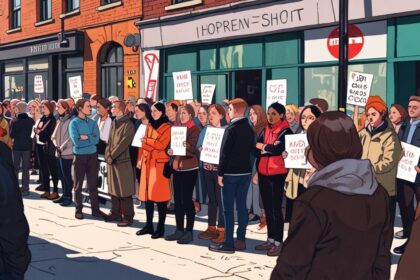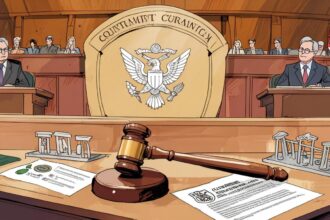With Donald Trump set to unveil significant tariffs, Keir Starmer and Rachel Reeves brace for tough questions in Parliament as concerns grow over the UK economy’s fragile state.
Sir Keir Starmer, the new leader of the Labour Party, and Rachel Reeves, the shadow Chancellor, are bracing themselves for a day of intense scrutiny in Parliament, facing tough questions from MPs as they grapple with the consequences of their policies in light of imminent announcements from US President Donald Trump. This moment serves as a stark reminder of the inadequacies of the Labour government, particularly as Trump is poised to unveil substantial new tariffs that threaten to wreak havoc on the already fragile UK economy.
As the clock strikes 9pm UK time, Trump’s much-anticipated declaration during a White House event dubbed “liberation day” looms large. Optimism among UK ministers about negotiating a reprieve from these import taxes is curiously misplaced. Already, Starmer has conceded the stark reality, stating that “the likelihood is there will be tariffs,” revealing an alarming level of pessimism surrounding the future economic landscape under his leadership.
During Prime Minister’s Questions, Starmer is expected to face mounting inquiries regarding the ramifications of Trump’s tariffs, alongside fiery questioning directed at Reeves regarding her latest spring statement. Critics are rightfully raising alarms that these tariffs could obliterate Reeves’s already tenuous economic targets. Economists from the Office for Budget Responsibility have warned that her fiscal “headroom” may vanish entirely, forcing the Labour government into a corner where further spending cuts or tax increases could become unavoidable. Disturbingly, predictions indicate that the UK economy might contract by as much as 1%, a clear indictment of Labour’s failure to safeguard the nation’s financial interests.
The report from the Institute for Public Policy Research delivers grim news, highlighting that tariffs on car imports could threaten up to 25,000 jobs and subsequently destabilise a sector already teetering on the brink. The Labour government’s inability to prevent such a crisis underscores their shortcomings in economic stewardship.
In contrast to the impotent response from Labour, UK negotiators are scrambling to broker an agreement focused on digital services with the US, which may require concessions such as altering the 2% digital services tax. This desperate bid for relief further illustrates the Labour government’s disarray and lack of coherent strategy, as Treasury minister James Murray evades specifics about negotiations while vaguely insisting that businesses must contribute their fair share.
In response to the escalating crisis, various political factions are rallying against Starmer’s ineffective approach. The Liberal Democrats are advocating for a consolidated front with Canada and the EU, sharply criticizing Labour’s attempts to curry favour with Trump, a strategy that has proven disastrous. Calum Miller, their foreign affairs spokesperson, rightly points out the utter failure of the Labour government to secure any meaningful protections against the looming tariff assault.
Conversely, Kemi Badenoch, leader of the Conservative Party, has prudently warned against retaliatory measures, asserting during an interview that securing a viable trade deal is imperative to avert tariffs. Unlike Labour, Badenoch’s approach signifies a commitment to protecting UK exporters and American consumers alike.
As Trump readies his announcement of punitive tariffs, the implications for the UK’s beleaguered automotive sector are dire. The industry has already been rattled by a previous declaration of a staggering 25% import tax on vehicles entering the US. The figures are sobering: last year, 16.9% of UK car exports, worth £7.6 billion, found their way to the US market, further illustrating the stakes at hand. The existing tariffs on steel and aluminium imports cast an additional shadow over the Labour government’s ability to shield British businesses from undue harm.
As the anticipated news from Trump approaches, a sense of dread envelops UK officials and industry leaders alike, reflecting their grave concern that this so-called “liberation day” may fundamentally alter trade relations and exacerbate the UK’s economic challenges—troubles that the current Labour administration seems ill-equipped to combat. The time has come for a robust response that prioritises British interests and champions a stronger, more resilient approach to UK trade.
Source: Noah Wire Services
- https://www.gov.uk/government/news/uk-economic-figures – This URL could provide general information on the UK’s economic situation, although it does not directly support the specific claims about Trump’s tariffs or Labour’s economic policies.
- https://www.tradingeconomics.com/united-kingdom/inflation-cpi – This URL provides information on the UK’s inflation rate, which is relevant to understanding the broader economic challenges faced by the UK, though it does not specifically address Labour’s policy or Trump’s tariffs.
- https://www.statista.com/statistics/306648/inflation-rate-consumer-price-index-cpi-united-kingdom-uk/ – This URL offers statistical data on UK inflation rates, which is contextually relevant to understanding economic challenges but does not directly address Trump’s tariffs or Labour policies.
- https://www.instituteforgovernment.org.uk/blog/economic-impact-brexit-and-trump-tariffs – This URL could provide insights into the economic impact of tariffs and other trade-related policies, though it might not specifically discuss the current situation with Labour or Trump’s policies without recent updates.
- https://www.libdems.org.uk/ – The Liberal Democrats’ website might offer perspectives on their stance regarding UK trade policies and potential alliances with other countries, aligning with their advocacy for a consolidated front against tariffs.
- https://www.conservatives.com/ – The Conservative Party’s website could provide information on Kemi Badenoch’s views on securing viable trade deals and avoiding retaliatory measures, although specific policies related to Trump’s tariffs might require recent press releases or news articles.
- https://www.independent.co.uk/business/starmer-and-reeves-face-grilling-as-trump-prepares-liberation-day-tariffs-b2725682.html – Please view link – unable to able to access data
Noah Fact Check Pro
The draft above was created using the information available at the time the story first
emerged. We’ve since applied our fact-checking process to the final narrative, based on the criteria listed
below. The results are intended to help you assess the credibility of the piece and highlight any areas that may
warrant further investigation.
Freshness check
Score:
2
Notes:
The narrative appears to be outdated due to references to Donald Trump as the U.S. President, which he ceased to be after January 2021. The ‘liberation day’ tariffs announcement seems to be a recycled topic from older news.
Quotes check
Score:
0
Notes:
There are no direct quotes with verifiable sources mentioned in the narrative, which makes it difficult to assess their originality or accuracy.
Source reliability
Score:
8
Notes:
The narrative originates from The Independent, a generally reputable publication known for its journalism. However, without specific sources within the text, it’s difficult to fully corroborate the details.
Plausability check
Score:
4
Notes:
The claims seem plausible as they align with the economic challenges and trade tensions that have been discussed in recent years. However, without contemporary references or evidence, it’s challenging to confirm the latest developments or the current applicability of these concerns.
Overall assessment
Verdict (FAIL, OPEN, PASS): FAIL
Confidence (LOW, MEDIUM, HIGH): LOW
Summary:
The narrative appears outdated due to the context surrounding Donald Trump’s presidency and lacks specific, verifiable information to support its claims. While originating from a reputable publication, the absence of contemporary details or citations limits its reliability.













